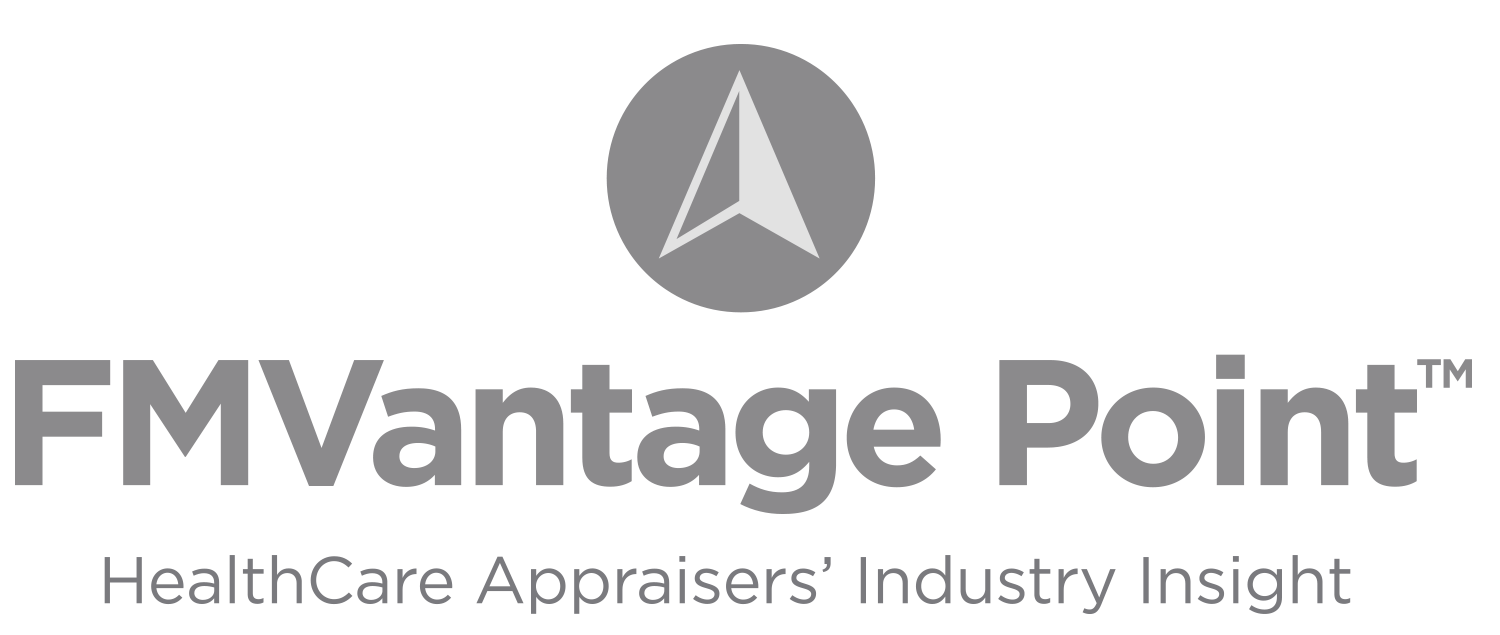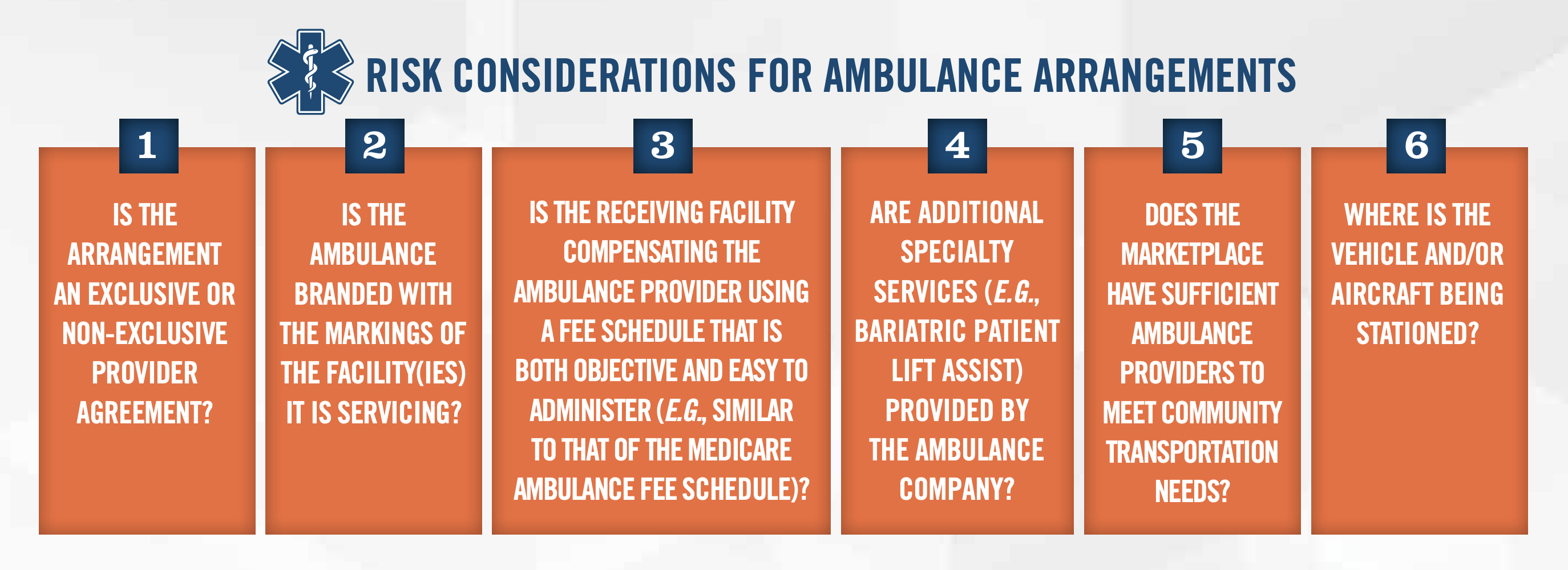Authors: Ciara A. Pocino, Hunter A. Wolfel and Luis A. Argueso

In recent years, HealthCare Appraisers has seen regulators increasingly sounding the sirens over ambulance “swapping” arrangements. Under an ambulance swapping arrangement, a provider of air or ground ambulance services will offer its services to healthcare systems and/or facilities at a discount in exchange for the promise, implied or explicit, of more lucrative transports of patients covered by government programs such as Medicaid and Medicare, and, as a result, have the potential to implicate the Stark Law and/or Anti-Kickback Statute.
For example, in 2015, a nursing home operator settled with the government for over $3 million based on allegations of ambulance swapping.[1] Also in 2015, an ambulance provider settled with the government for more than $11.5 million over similar allegations.[2] Therefore, it’s clear that the government will pursue both ambulance companies and the facilities they service, underscoring the importance to all parties of ensuring compliance with the various state and federal laws and regulations that govern such arrangements.
With the swift spread of the Coronavirus Disease (i.e., COVID-19) over the past several months, increased attention has been given to the current regulations in place for emergency medical transports, as well as calling for the implementation of new guidance and requirements. As briefly discussed in HAI’s publication, titled The Value of Fair Market Value Review in a Hospital’s Preparation and Response to Coronavirus, on March 16, 2020, the Centers for Medicare and Medicaid Services (i.e., CMS) issued new guidance meant to serve as a call to action for hospitals complying with the Emergency Medical Treatment and Labor Act (“EMTALA”). Guidance included commentary on the implementation of emergency medical transports for Medicare beneficiaries affected by COVID-19.[3]
Under this new guidance, Medicare-participating hospitals with the capabilities needed to stabilize COVID-19 patients are required to accept all transfers of Medicare beneficiaries with emergency medical conditions. Additionally, as hospitals have been granted the ability to set-up alternative on-campus and/ or off-site COVID-19 screening sites, the subject hospitals are required to ensure they have the capability to arrange appropriate transfer of patients in need of further care for COVID-19 symptoms utilizing local emergency medical services. Per CMS guidance, Medicare will continue to cover emergency ambulance transports for COVID-19 patients under Medicare Part B. Such services will come with a deductible of $198 and beneficiaries will be responsible for 20 percent of the Medicare approved amount.[4]
Given the grey area that accompanies approved payments for ambulance transports, CMS has further specified that Medicare will cover ground ambulance transports to hospitals, critical access hospitals, or skilled nursing facilities when Medicare beneficiaries cannot safely be transported in any other vehicle.
In a scenario in which immediate care is required, Medicare may also cover the costs of air ambulance transportation. In the case of an emergency, should the nearest medical facility be unavailable or ill equipped to treat a COVID-19 patient, Medicare will also cover the costs associated with transporting the patient to another facility granted that that facility is the nearest facility with the capabilities necessary to stabilize a COVID-19 patient.[5]
Based upon the government’s enforcement trend and in light of the potential spike in Medicare transports due to COVID-19, we believe the following represent some important risk factors to consider when evaluating the fair market value (“FMV”) compensation payable under an ambulance transportation arrangement:

Each of the aforementioned items may materially impact the FMV compensation associated with an ambulance arrangement. HealthCare Appraisers has the knowledge and expertise to properly consider and account for all factors of an ambulance transportation arrangement in arriving at an FMV conclusion.
![]() FMV PITFALL: When evaluating the FMV compensation payable under ambulance transportation services arrangements, it is important to consider not only the value of the transport, but all other elements of the arrangement, including, but not limited to, the level of exclusivity, marketplace factors, and use of branding. An inexperienced valuator may not know to look beyond the four corners of the ambulance transportation arrangement when determining FMV, thereby potentially putting your organization at risk of a swapping allegation. HealthCare Appraisers is knowledgeable on changes in Medicare ambulance transportation regulations related to COVID-19 and stands ready to assist in providing your organization with quick fair market value guidance.
FMV PITFALL: When evaluating the FMV compensation payable under ambulance transportation services arrangements, it is important to consider not only the value of the transport, but all other elements of the arrangement, including, but not limited to, the level of exclusivity, marketplace factors, and use of branding. An inexperienced valuator may not know to look beyond the four corners of the ambulance transportation arrangement when determining FMV, thereby potentially putting your organization at risk of a swapping allegation. HealthCare Appraisers is knowledgeable on changes in Medicare ambulance transportation regulations related to COVID-19 and stands ready to assist in providing your organization with quick fair market value guidance.
[1] George, Cindy. “Nursing home agrees to pay $3M in ambulance-swapping case.” EMS1.com, https://www.ems1.com/legal/articles/nursing-home-agreesto-pay-3m-in-ambulance-swapping-case-KxPPvCroKDlFy7cm/. Accessed 2 March 2020.
2 Adams, Andie. “Ambulance Companies to Pay $11.5M in “Swapping Kickback” Scheme.” NBCSanDiego.com, https://www.nbcsandiego.com/news/local/ambulance-companies-to-pay-115m-in-swapping-kickback-scheme/113875/. Accessed 2 March 2020. 3 “Emergency Medical Treatment and Labor Act (EMTALA) Requirements and Implications Related to Coronavirus Disease 2019 (COVID-19).” CMS.gov,
https://www.cms.gov/files/document/qso-20-15-emtala-requirements-and-coronavirus-0311-updated-003pdf.pdf-1. Accessed 19 March 2020.
4 Id.
5 “Coverage and Payment Related to COVID-19 Medicare.” CMS.gov, https://www.cms.gov/files/document/03052020-medicare-covid-19-fact-sheet.pdf.
Accessed 19 March 2020.
